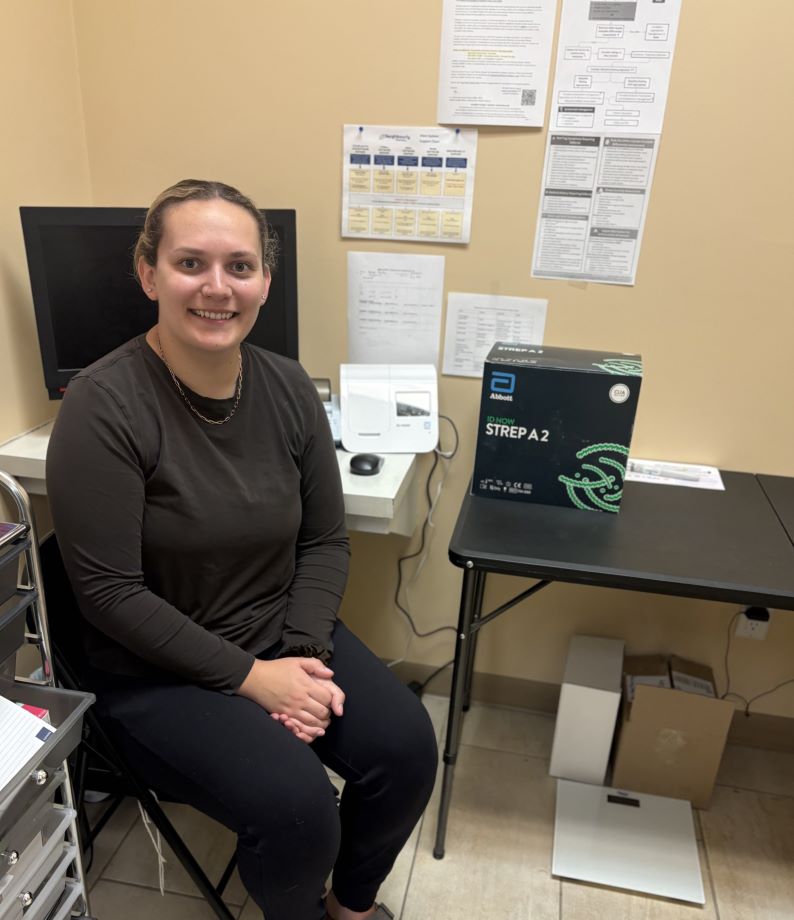A new healthcare pilot launched earlier this year is showing promising results, and Stoughton’s New Hope Pharmacy is among the select sites helping to lead the way.
The Pharmacist-Led Point-of-Care Testing Pilot, introduced in January 2025, allows participating pharmacists to conduct rapid testing for strep throat and assess patients for ear infections. The initiative is part of a broader effort to expand primary care access across Saskatchewan, particularly in rural and remote communities where doctor availability is limited.
Tiara Davy, a staff pharmacist at New Hope Pharmacy in Stoughton, said the decision to join the pilot came naturally.
“We only have a doctor here twice a week, so we thought it would be a good asset to our community. We applied, they liked the aspect that we were kind of rural, and we only had a doctor available a couple of days a week, so they thought we would be a good spot to have this.”
Since joining the program, New Hope Pharmacy has seen a steady increase in people accessing the service.
"I think now if you search up strep testing, it shows that pharmacists are able to do it. It also lets them know that New Hope Pharmacy is part of this pilot project, so there has been a lot of people who go to their own pharmacies, such as pharmacies in Estevan, and they are then directed to us because they are unable to perform strep testing at this time. I think that patients are more willing to let pharmacists take over this part of care. We thought we may get some backlash with pharmacists in general being able to do this, but everyone has been very thankful that we have this ability."
Province-wide, the pilot has delivered 3,135 assessments as of mid-July—745 for sore throats and 2,390 for suspected ear infections. Notably, 53 percent of those cases did not require a prescription, highlighting the benefits of accessible clinical evaluations.
With a shortage of physicians in many rural areas, Davy says programs like this one offer a practical solution.
“We're hoping that this pilot project is going well for all other places. I know it's going well here, so hopefully it will become a reality in most of the pharmacies who want to participate, which I think would definitely help. We are limited to what we can do, but there's a lot of strep and a lot of ear infections that get treated by physicians who sometimes are overburdened, and then they have to sit in the ER and wait. It would be nice to see other places around here have access to this program, too.”
Davy also noted how the program is helping children access care more easily in a system that often directs them to emergency rooms.
“There are some age limits that we have to be cautious about, and would have to be referred regardless. If it’s a kid that cooperates and is in the right age range. We're more than happy to be able to provide those services instead of them having to sit all day in the ER.”
The project is supported by more than 140 trained pharmacists and overseen by the Saskatchewan College of Pharmacy Professionals. New Hope Pharmacy is one of 11 pilot locations offering both strep and ear infection services, while 35 other pharmacies are conducting ear infection assessments only.
Rural and Remote Health Minister Lori Carr praised the initiative.
“This pilot is one of the first in Canada and shows that pharmacists play a vital role in enhancing access to timely care for common conditions. The fast access to assessment and treatment is reassuring to patients and strengthens team-based primary health care in the province.”
Davy echoed those hopes for the future of pharmacist-led care in Saskatchewan.
“Yeah, I think we have the capability of doing these and more minor ailments, maybe not so much with our work schedules. There are pharmacists looking for more clinical roles that we could potentially hire to run more clinic programs within pharmacies across our province. So we can always hire them to help with those kinds of clinical services. I would like to see more in our province to kind of take the load off the ERs and the Doctors that we have now. I think we're fully capable, and I think we would do a good job at it if we had more opportunities.”
She also shared how the pilot has had a positive impact on their small-town pharmacy.
“We're happy here as a small pharmacy in a small town, that we're getting more traffic in our pharmacy, and we're having people reach out from all over to come and use our services. And I think it's important that we continue to provide these services and in other areas too.”
The Saskatchewan government says the program may be expanded to more pharmacies following further evaluation of its success. A full list of participating pharmacies and conditions they assess is available at the Saskatchewan College of Pharmacy Professionals website.
